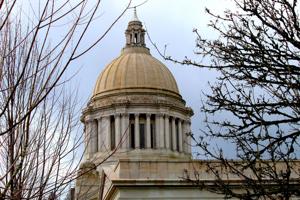Washington lawmakers pass capital gains tax, leave little time for a battle at the ballot box

(The Center Square) – Washington will now join 41 other states taxing profits on capital gains with the passage of a bill Democrats are determined to protect from the ballot box.
Introduced by state Sen. June Robinson, D-Everett, Senate Bill 5096 taxes the sale of stocks, bonds, and other paper assets in excess of $250,000 at a rate of 7%. It exempts real estate, retirement accounts, timberland, and livestock. Legislative analysts project the tax will pour $445 million into state coffers by 2023, $981 million by 2025, and $1.06 billion by 2027.
The first $500 million will go into the state’s Education Legacy Trust Fund Account. What money is left over will pay for public school construction instead of funding the Working Families Tax Exemption as initially written. It takes effect Jan. 1, 2022.
That money will come from the pockets of some 7,000 Washington taxpayers or 1% of state households, according to a legislative analysis. They include two of the richest men in the world–Amazon’s Jeff Bezos and Microsoft founder Bill Gates.
Under a necessity clause, SB 5096 was exempted from a voter referendum requirement because the tax money is “necessary” for the operation of state government. The clause, a major sticking point for critics, was tossed out when it passed the Senate in March by a narrow vote of 25-24. It was restored when it cleared the House last week, picking up support from state Rep. Bruce Chandler, R-Granger, on its first roll call vote.
On Sunday, it passed the Senate by the same margin with the clause intact, plus a tax credit of up to $100,000 for charitable donations over $250,000 backed by Republicans.
SB 5096 could be repealed with a statewide initiative that would require twice the number of signatures as a voter referendum or 324,516 in 2021. The deadline to file the former this year is July 2.
Passing a capital gains tax has been on Gov. Jay Inslee’s to-do list as far back as 2014. In 2020, he proposed a 9% tax on stock and bond sales over $25,000, raising $975 million by 2023. Inslee, now in his third and final term, is expected to sign SB 5096 into law once it lands on his desk.
The case for a capital gains tax has relied on a handful of talking points from Olympia’s Democratic majority. Up until March, the party pushed the idea that a capital gains tax was the only way to rebalance the state budget before forecasts put Washington’s balance sheet back in the black. Since then, Democrats have shifted the conversation away from the fiscal necessity of passing a capital gains tax to the state’s duty to rebalance its “upside-down” tax code.
“Washington state has the most upside-down and regressive tax code in the nation,” said state Rep. Noel Frame, D-Seattle, who chairs the House Finance Committee. “It’s a tax code that asks the lowest income Washingtonians to pay six times more in taxes as a share of their income when compared to our highest-earning households.”
A capital gains tax, Democrats argue, would help reduce the sales tax burden on low-income households that studies suggest pay a larger portion of household income than others. Sales taxes account for almost half of Washington’s operating revenue, in large part due to the state constitution’s ban on income taxes. Democrats have branded SB 5096 as an excise tax – one their colleagues across the aisle are not buying.
Washington Republicans, now into their second year as Olympia’s minority party, have railed against a capital gains tax all session long. The state doesn’t need it, voters don’t want it, and the courts keep striking them down, they argue.
“The US Supreme Court, the IRS, and every state with a capital gains tax considers it to be an income tax,” said state Rep. Jeremie Dufault, R-Selah. “It moves us dangerously close to becoming a rainier version of California – a state businesses and people are leaving in such high numbers, that for the first time since it joined the union in 1850, it is expected to lose a congressional seat this year. Please stop our great state’s decline.”
Chuck Collins, a senior scholar on inequality at the progressive Institute for Policy Studies and former advisor to Bill Gates Sr., father of Bill Gates, says those fears are misplaced.
“The notion of wealthy people moving because of taxes is greatly exaggerated,” Collins told the Center Square. “Wealthy people are often rooted in place. That’s why so many billionaires continue to maintain their tax residency in high-tax states like California and New York. Higher tax states have higher quality of life, better public investments in amenities that wealthy people enjoy along with everyone else.”
Others said they were disappointed that Democrats passed the capital gains tax without a wider discussion on its merits.
“We deserve a much more honest debate and this was incredibly disappointing to see, both on this being an income tax and hiding the fact that they were trying to stop a referendum, was not part of the honesty of this debate,” said Jason Mercier, Director of the Center for Government Reform at the conservative Washington Policy Center.
It’s unclear how much support the state’s capital gains tax will have in the court of public opinion. In a February King 5/Survey USA poll, 59% of respondents voiced support for a capital gains tax, with 29% opposed and 12% undecided. A Crosscut/Elway poll from February showed 41% of respondents supported one with 59% opposed. The polls’ margins for error were 4% and 5%, respectively.
Since 1932, Washington voters have said no to income taxes 11 times. The last time was in 2010.
Disclaimer: This content is distributed by The Center Square

